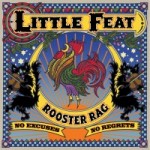The history books say that when guitarist Paul Barrere, bassist Kenny Gradney and percussionist Sam Clayton joined Little Feat for the band’s third album, Dixie Chicken, the group moved dramatically toward a New Orleans style. The percolating counterpoint, deep fried funk and multi-guitar pyrotechnics that became the band’s musical trademark survived the loss of its founding member Lowell George, numerous personnel changes and the recent death of original drummer Richie Hayward.
Remarkably, the band’s 16th studio album sounds as fresh as such classics as Dixie Chicken and Feets Don’t Fail Me Now. Barrere and guitarist Fred Tackett have an even deeper rapport than the famed George/Barrere tandem. Every song on the album rings with exquisite guitar interlace, so soulful and inventive that it never sounds cliched or overwrought. Their simpatico reminds me strongly of the relationship shared by Radiators guitarists Dave Malone and Camile Baudoin, who along with Anders Osborne, Tab Benoit and other local players are close friends with the Feat. Tackett has emerged as a major songwriter, contributing the eerie “Church Falling Down” and three other songs to the album. Barrere himself sets the album’s tone with an original take on Mississippi John Hurt’s “Candy Man Blues” played at warp speed. Barrere also contributed one of the album’s strongest tracks, “Just a Fever,” co-written with the great Texas songwriter Stephen Bruton, who recently passed away. Clayton closes things out with a strong vocal on Willy Dixon’s “Mellow Down Easy.”
One of the reasons this album takes its place alongside Feat’s myth-defining discs is the presence of lyricist Robert Hunter, who co-wrote four outstanding songs with keyboardist Bill
Payne. The title track has the untrammeled joy and slightly skewed surrealism that brands it as a classic Feat-ism: “don’t need a shot/don’t need a booster/ladies of the jury/stroke my rooster/ don’t complain/it’s not my nature/ take my milkshake/straight – no chaser.” In “Salome,” Hunter conjures a “jasper girl” and even gives directions: “bear east on sixty-three/south of aqua cay/ you’re still in Texas/but just a stone’s throw away/cross the river/ lies lou’isian-i-ay.” Hunter brings it back west to Dead territory for the raucous “Rag Top Down”: “better beware ‘cuz I’m back in town/driving my chevy with the rag-top down/beware of what? well I don’t know/ I’m all shook up and ready to go.” Hunter has a knack for conjuring myths, and he draws on the Feat genius for mitigating the blues with a rocking groove on “Way Down Under”: “sing your song as long as you can/top of your lungs let the rest be damned/it’s time to find out on your own/where your chihuahua buried his bone.” Payne’s vocals and keyboard work on these songs are among the best of his career.
After a few listens to all this great playing and songwriting a kind of theme emerges when the dust clears: These are guys who’ve lived the rock life to its excessive full, seen some of their partners fall by the wayside and survived to wonder what it all means, only to decide that they can rediscover the truths that animated their creative lives without the aid of the artificial sweeteners of their wild youth. It’s an album of strength and wisdom, an old folks boogie to be sure. But this is one mind’s message these bodies have no trouble filling.





